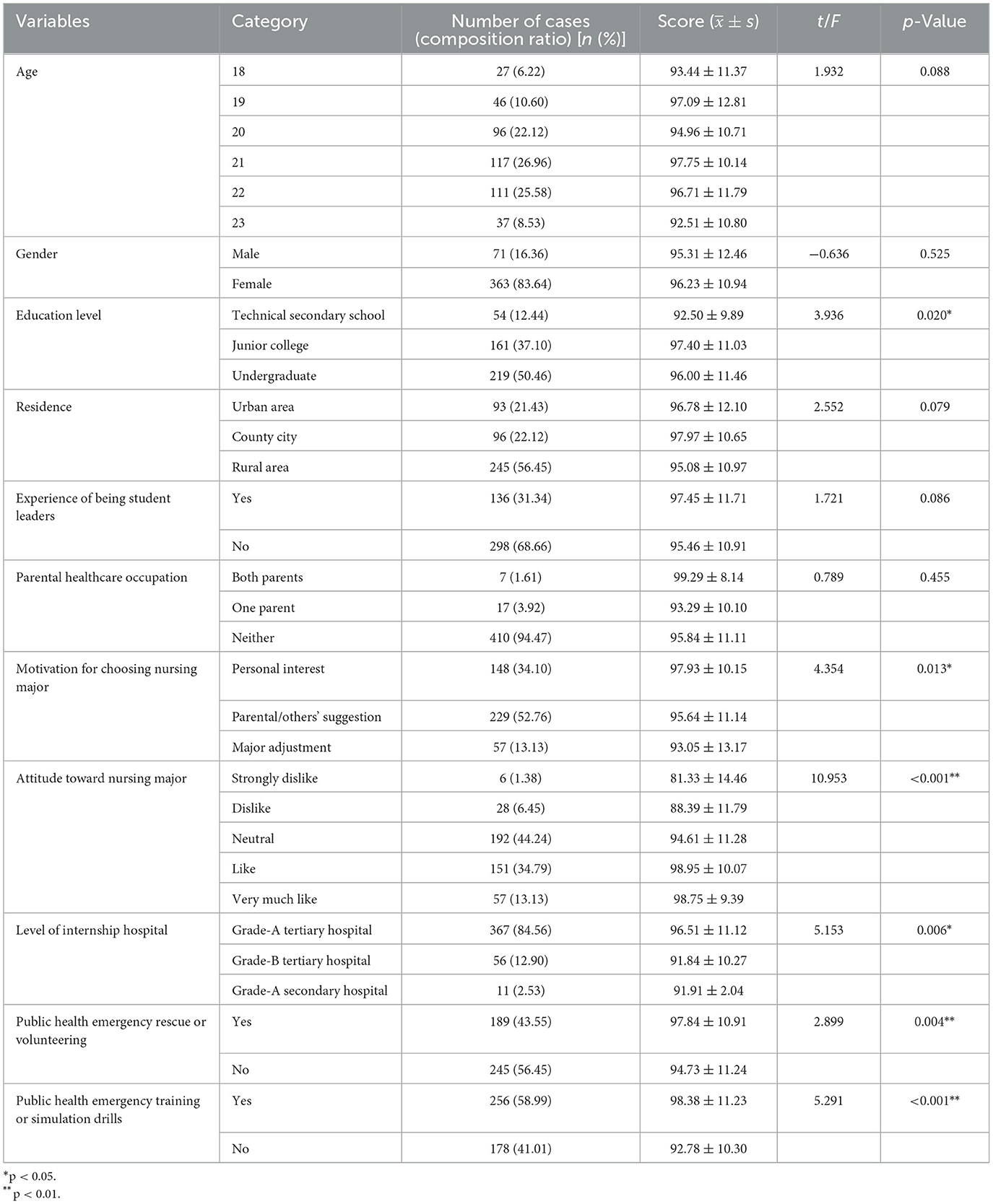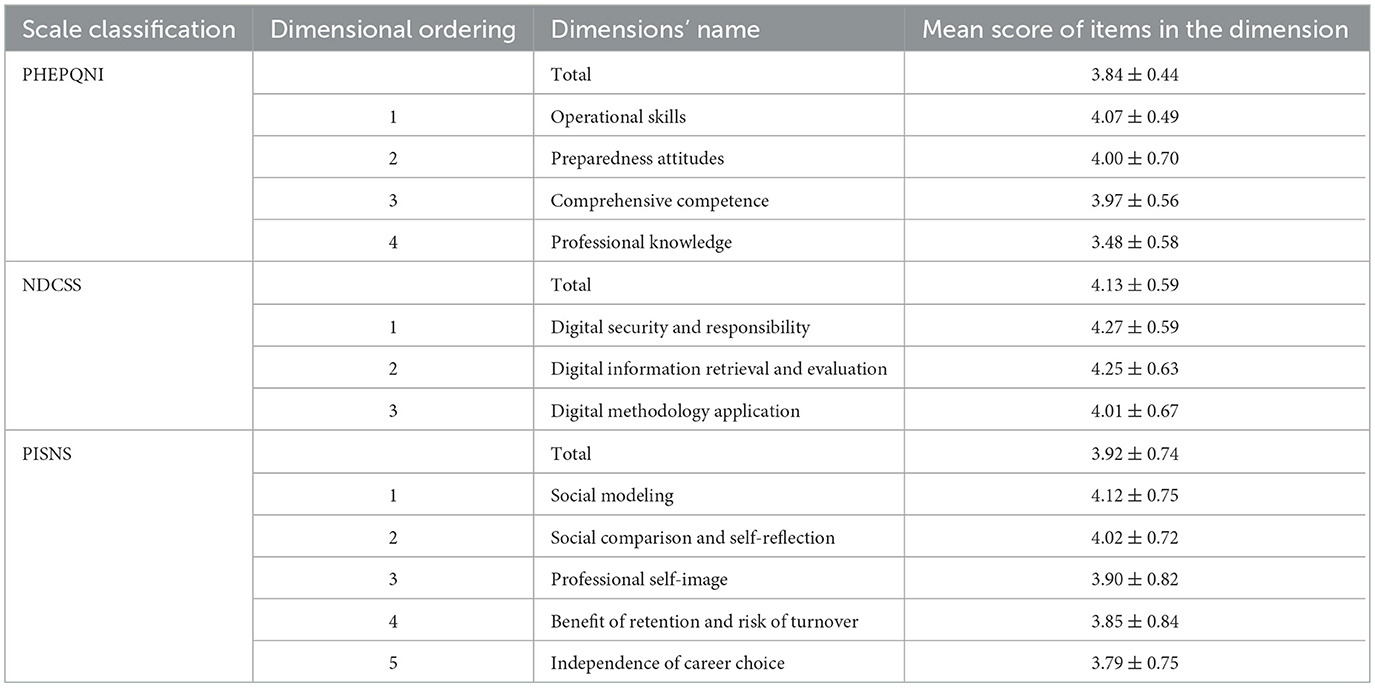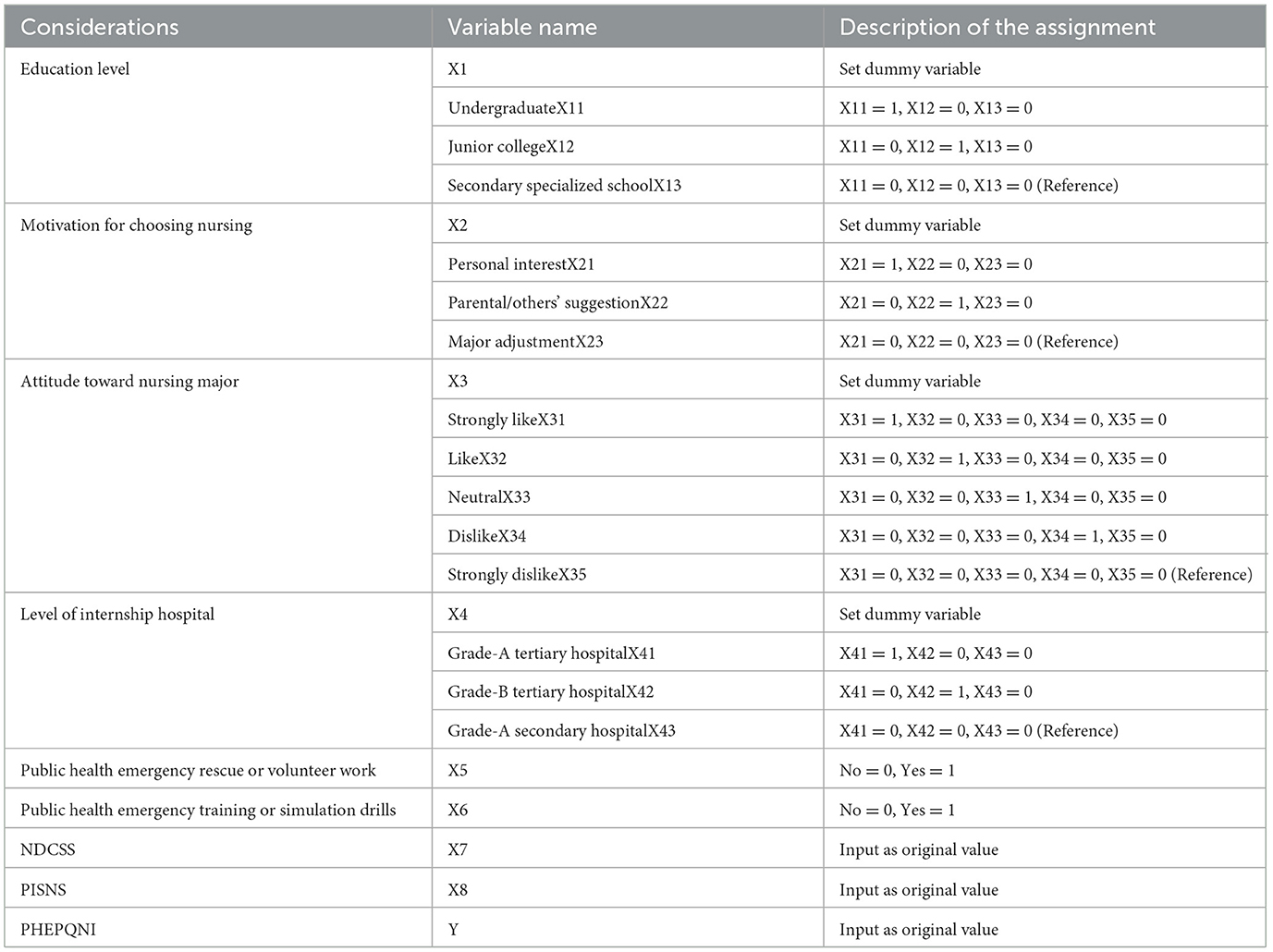- 1School of Nursing, Xi'an Jiaotong University Health Science Center, Xi'an, Shaanxi, China
- 2School of Foreign Studies, Xi'an Jiaotong University, Xi'an, Shaanxi, China
- 3Xi'an No.3 Hospital, The Affiliated Hospital of Northwest University, Xi'an, Shaanxi, China
Background: The frequent occurrence of public health emergencies in the 21st century has posed significant challenges to global healthcare systems. As crucial members of medical teams, Generation Z nursing interns play a pivotal role in emergency response. However, systematic assessments of preparedness encompassing emergency attitude, professional knowledge, operational skills, and comprehensive competencies among nursing interns remain unexplored.
Objective: This study aims to assess the public health emergency preparedness of Generation Z nursing interns in the post-pandemic era and identify key influencing factors, providing insights for optimizing nursing education and clinical training.
Methods: A cross-sectional survey was conducted among 434 Generation Z nursing interns in Zhengzhou, China, from January to February 2025 using convenience sampling. Data were collected using a general information questionnaire, Public Health Emergency Preparedness Questionnaire for Nursing Interns, Nurse's Digital Competence Self-assessment Scale, and Professional Identity Scale for Nursing Students. Data were analyzed by descriptive statistics, univariate analysis, Pearson's correlation, and multiple stepwise regression.
Results: The total score of public health emergency preparedness of 434 nursing interns was 95.79 ± 11.03, with notable deficiencies in professional knowledge and comprehensive competencies. Multiple stepwise regression analysis revealed that digital competence, professional identity, attitude toward the nursing major, and level of internship hospital were the main influencing factors of emergency preparedness (all p < 0.05).
Conclusion: The findings indicate that while Generation Z nursing interns demonstrate a high proficiency in emergency operations and a positive attitude toward emergency response, deficiencies persist in specialized emergency knowledge and psychological intervention capabilities. It is recommended that nursing schools and internship hospitals implement integrated emergency training programs, complemented by enhanced digital competency and professional identity cultivation, to holistically bolster preparedness for future public health emergencies.
1 Introduction
A Public Health Emergency is defined as a sudden and unexpected incident that poses significant risks to the health of a population. Such events encompass major infectious disease outbreaks, clusters of unexplained illnesses, severe foodborne or occupational poisoning incidents, and other events that critically endanger population health (1). The frequent occurrence of public health emergencies has posed significant challenges to medical systems globally (2). As crucial members of clinical healthcare teams, nurses play a pivotal role in emergency response and recovery efforts during crises (3). Nursing interns serving as clinical personnel undertake high-intensity, high-risk care responsibilities during such emergencies (4). Throughout the COVID-19 pandemic, several studies (5–9) have documented that the substantial contributions of nursing interns across multilevel healthcare systems, including hospital wards, public health agencies, and community clinics, where they executed tasks spanning patient care, epidemic management, and other emergency response procedures. As China's future frontline clinical nursing workforce, nursing interns constitute both a vital reserve of healthcare talent and an essential emergency response contingent, substantially having a positive impact on the overall effectiveness of healthcare systems in responding to public health emergencies through their contributions (10). Despite their active involvement, the preparedness of nursing interns in addressing public health emergencies remains a concern. Several studies (5, 7, 11, 12) have indicated that nursing interns frequently encounter critical challenges due to their insufficient acquisition of professional knowledge, limited practical experience in crisis response, inadequate psychological resilience, and other competency gaps during public health emergencies, all of which warrant focused attention.
Nursing interns' public health emergency preparedness refers to their readiness level in emergency attitude, professional knowledge, emergency operational skills, and comprehensive competence to competently fulfill emergency healthcare roles during outbreak scenarios (13). Generation Z (born 1995–2009) nursing interns, as the first generation born entirely within the digital age, represent a unique cohort shaped by accelerated digital technology advancement and the transformative impact of COVID-19 pandemic (14). In the post-pandemic era, clinical internships function not only as a pivotal transitional stage for nursing students to develop their professional role as next generation practitioners (15), but also as an integrative platform for contextualizing theoretical knowledge, honing clinical skills, and accumulating emergency expertise, all of which are critical to comprehensively strengthening Generation Z nursing interns' preparedness for public health emergencies. While current studies (16–18) predominantly concentrate on nurses' competencies and improvement strategies in public health emergencies, the emergency preparedness of nursing interns during such crises remains underexplored, particularly research combining digital competence with professional identity. Digital competence enables nursing interns to effectively integrate technologies into clinical practice, thereby enhancing work efficiency and care service quality (19–21) while strengthening public health emergency response capabilities. Furthermore, the complexity of public health emergencies demands not only technical competence from nursing interns but also strong professional commitment. Professional identity, as a paramount intrinsic motivator, may systematically enhance their emergency preparedness through pathways including strengthening accountability, enhancing learning motivation, and bolstering resilience (22–24). Emergency preparedness constitute a foundational element in ensuring effective medical rescue and nursing care delivery during public health emergencies. Neglecting the emergency preparedness of Generation Z nursing interns, who represent an important workforce contingent in modern healthcare systems, may critically compromise future emergency response effectiveness, hinder the formation of specialized nursing rapid response units, and exacerbate preexisting deficiencies in medical systems during pivotal stages of public health emergency (13).
Therefore, this study aims to investigate the emergency preparedness of Generation Z nursing interns in the post-pandemic era through a cross-sectional survey, with the objectives of assessing the level of current preparedness for public health emergencies and identifying critical factors influencing their preparedness. The findings of this study will enable nursing schools and internship hospitals to operationalize precision educational strategies in the post-pandemic era, therefore systematically elevating Generation Z nursing interns' emergency preparedness, ultimately fortifying the adaptive and resilience capacity of healthcare systems when confronted with future public health emergencies.
2 Methods
2.1 Study participants
A convenience sampling method was used to select qualified nursing interns in Zhengzhou, China from January to February 2025. Inclusion criteria were as follows: (1) nursing students engaging in clinical internship; (2) nursing students born between January 1, 1995, and December 31, 2009; (3) voluntary participation in this study. Exclusion criteria were as follows: (1) clinically diagnosed psychological disorders; (2) being exposed to major life events within the preceding 3 months (e.g., severe illness, family adversity, or bereavement); (3) inability to comprehend survey items or demonstration of patterned responses. This study adhered to the Strengthening the Reporting of Observational Studies in Epidemiology (STROBE) guidelines.
2.2 Sample size
The G*Power 3.1.9 program was used to calculate the sample size. The minimum sample size required for conducting multiple linear regression analysis was calculated to be 301, with the following conditions: F tests - Linear multiple regression: fixed model, R2 deviation from zero, Effect size f2 = 0.15, significance level at α = 0.05, number of predictors = 80, and a power of 0.80. Considering a 20% non-response rate, a total of 450 questionnaires were distributed, and 434 valid questionnaires were recovered, with a validity rate of 96.44%.
2.3 Variables and instruments
2.3.1 General characteristics
The self-developed questionnaire included questions concerning participants' age, gender, education level, residence, experience of being student leaders, parental healthcare occupation, motivation for choosing nursing major, attitude toward nursing major, level of internship hospital, participation in public health emergency rescue or volunteering, and participation in public health emergency training or simulation drills.
2.3.2 Public Health Emergency Preparedness Questionnaire for Nursing Interns
The Public Health Emergency Preparedness Questionnaire for Nursing Interns (PHEPQNI) was developed by Xu (13). The scale contains four dimensions and 25 items, which are emergency attitude (three items), professional knowledge (eight items), emergency operational skills (six items), and comprehensive competence (eight items). Responses are rated on a 5-point Likert scale ranging from 1 (strongly disagree) to 5 (strongly agree), with higher composite scores indicating greater preparedness levels. The total Cronbach's α was 0.923, and the Cronbach's α of the dimensions ranged from 0.784 to 0.908 in this study.
2.3.3 Nurse's Digital Competence Self-Assessment Scale
The Nurse's Digital Competence Self-assessment Scale (NDCSS) was developed by Qin et al. (25). The scale contains three dimensions and 27 items, which are digital information retrieval and evaluation (five items), digital methodology application (14 items), digital security and responsibility (eight items). Responses are rated on a 5-point Likert scale ranging from 1 (strongly disagree) to 5 (strongly agree), with higher composite scores indicating stronger digital competency. The total Cronbach's α was 0.982, and the Cronbach's α of the dimensions ranged from 0.909 to 0.969 in this study.
2.3.4 Professional Identity Scale for Nursing Students
The Professional Identity Scale for Nursing Students (PISNS) was developed by Hao et al. (26). It is a psychometrically instrument widely used in China to evaluate the level of nursing students' professional identity. The scale contains five dimensions and 17 items, which are professional self-image (six items), benefit of retention and risk of turnover (four items), social comparison and self-reflection (three items), independence of career choice (two items), and social modeling (two items), with item 12 reverse-scored. The original study demonstrated that the total Cronbach's α is 0.830 and subscales range from 0.462 to 0.831. Responses are rated on a 5-point Likert scale ranging from 1 (strongly disagree) to 5 (strongly agree), with higher composite scores indicating stronger professional identity. The total Cronbach's α was 0.969, and the Cronbach's α of the dimensions ranged from 0.478 to 0.962 in this study.
2.4 Data collection
With the approval of nursing education departments across multiple hospitals in Zhengzhou, coordinated recruitment of nursing interns was conducted for centralized data collection. The participating hospitals were selected based on the following criteria: (1) major clinical training bases at different levels within Zhengzhou (including Grade-A tertiary, Grade-B tertiary, and Grade-A secondary hospitals); (2) the presence of a substantial cohort of Generation Z nursing interns actively undergoing clinical training within the hospital; (3) the hospital administration expressed willingness to provide support and research facilitation during the study period. Across all participating hospitals, research recruitment information were disseminated by nursing education departments during dedicated educational assemblies where nursing interns were centrally convened for clinical training. Professionally trained researchers explicitly explained the survey objectives and significance to participating nursing interns. With informed consent, Generation Z nursing interns voluntarily completed anonymous questionnaires independently. All questionnaires were collected immediately upon completion, and researchers conducted on-spot quality checks to ensure data authenticity and reliability.
2.5 Statistical analysis
The collected data were entered into Excel for validation and screening to ensure accuracy. Qualified datasets were imported into SPSS Statistics 27.0 software program for analysis. For large-sample data, when the absolute values of kurtosis index are < 10 and skew index are < 3 after statistical testing, the data are considered approximately normally distributed (27). Descriptive statistics were expressed as means with standard deviations for continuous variables. Intergroup differences in demographic characteristics were assessed using t-tests and analysis of variance (ANOVA). Pearson's correlation analysis was conducted to examine the associations among public health emergency preparedness of nursing interns, digital competency, professional identity, clinical pedagogical atmosphere, and proactive personality traits. A multiple linear regression model was constructed with the total score of public health emergency preparedness among nursing interns as the dependent variable. Statistically significant variables identified through univariate and correlation analyses were included as predictors, followed by stepwise regression procedures, and a value < 0.05 indicated statistical significance.
3 Results
3.1 Demographic characteristics
A total of 434 valid questionnaires were collected. Participants' ages ranged from 18 to 23 years, consistent with the Generation Z cohort (born 1995–2009) specified in our inclusion criteria, with an average age of 21.81 ± 1.33 years. The majority of the participants were female (83.64%), from rural areas (56.45%), and their parents without medical professional backgrounds (94.47%). Regarding educational background and internship experiences, a majority were undergraduate (50.46%), without a student leader experience (68.66%), undergoing internships within Grade-A tertiary hospital (84.56%). In terms of emergency experiences, more than half of the participants had not participated in emergency rescue or volunteer work during public health emergency (56.45%), while nearly three fifths of the participants (58.99%) had received training or participated in simulation drills for such events. More detailed demographic characteristics of the 434 participants are presented in Table 1.
3.2 Scores of the main variables
In the post-pandemic era, Generation Z nursing interns in this study demonstrated a mean public health emergency preparedness score of 95.79 ± 11.03. The mean score of items in the PHEPQNI, NDCSS and PISNS are detailed in Table 2, Figures 1–3.
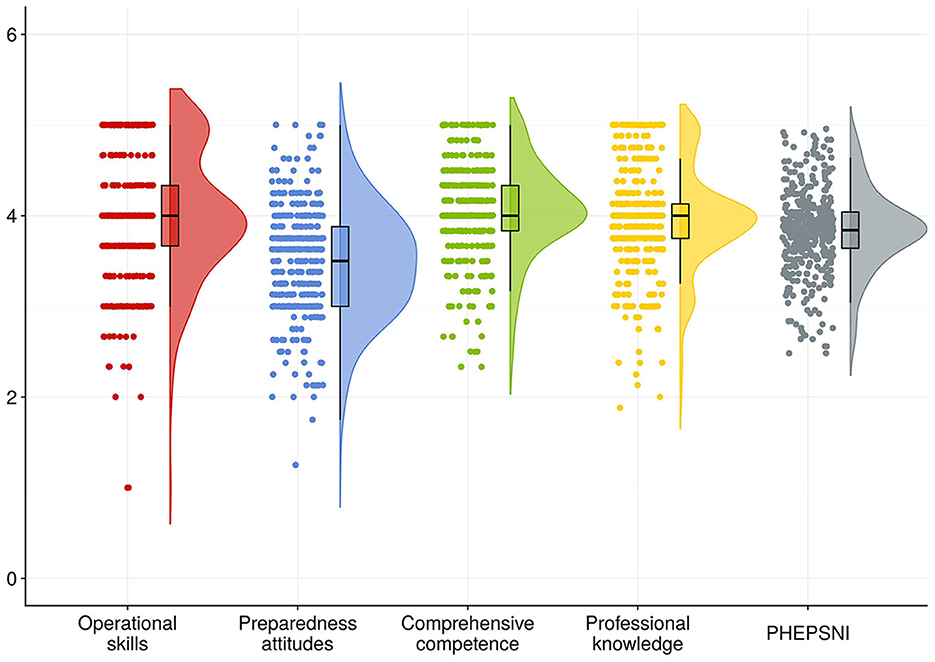
Figure 1. Mean score of items in the dimension of PHEPQNI. The horizontal axis indicated the different dimensions of PHEPQNI, and the vertical axis indicated the average scores of entries in the different dimensions.
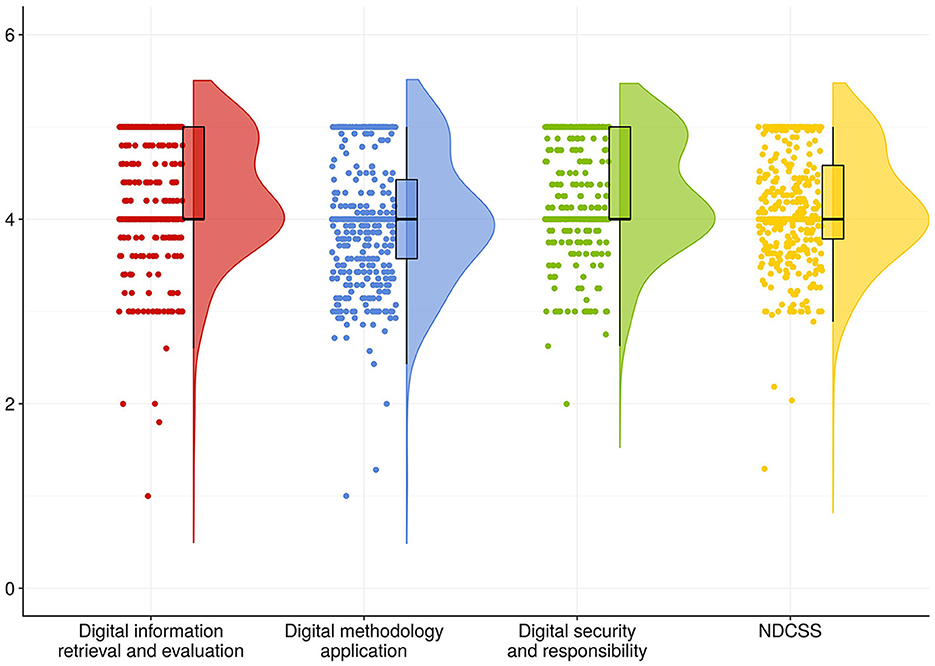
Figure 2. Mean score of items in the dimension of NDCSS. The horizontal axis indicated the different dimensions of NDCSS, and the vertical axis indicated the average scores of entries in the different dimensions.
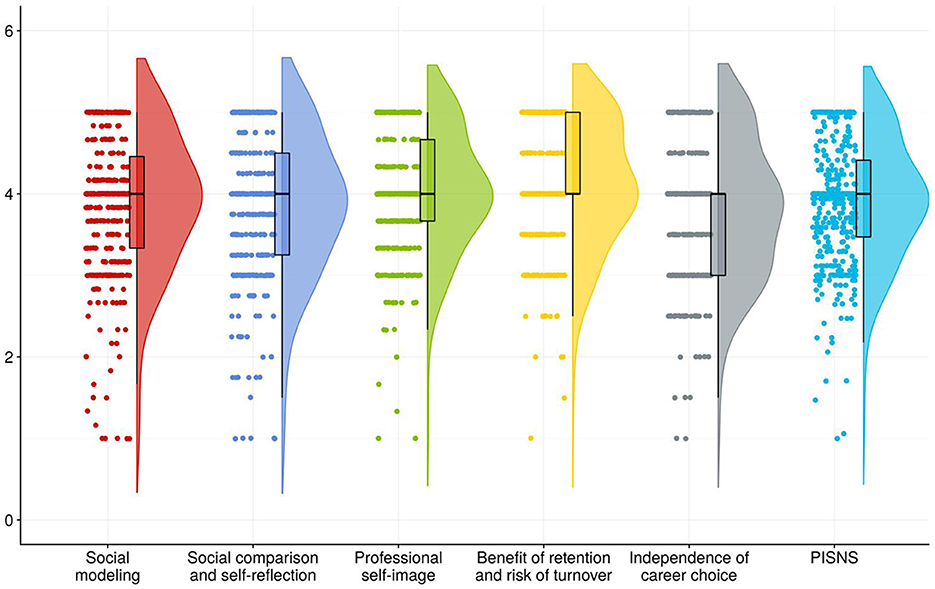
Figure 3. Mean score of items in the dimension of PISNS. The horizontal axis indicated the different dimensions of PISNS, and the vertical axis indicated the average scores of entries in the different dimensions.
Within the 25 items of PHEPQNI, the three lowest-scoring items were: “Demonstrating knowledge of radiation-related illnesses and nuclear exposure protective measures” (3.23 ± 0.75), “Understanding clinical manifestations and emergency protocols for biochemical attack-induced pathologies, including symptom recognition and immediate interventions” (3.41 ± 0.79), and “Understanding key provisions outlined in Regulations on Emergency Response to Public Health Incidents” (3.41 ± 0.80). For each scale, the three lowest-scoring items ranked in descending order of their mean values were detailed in Table 3.
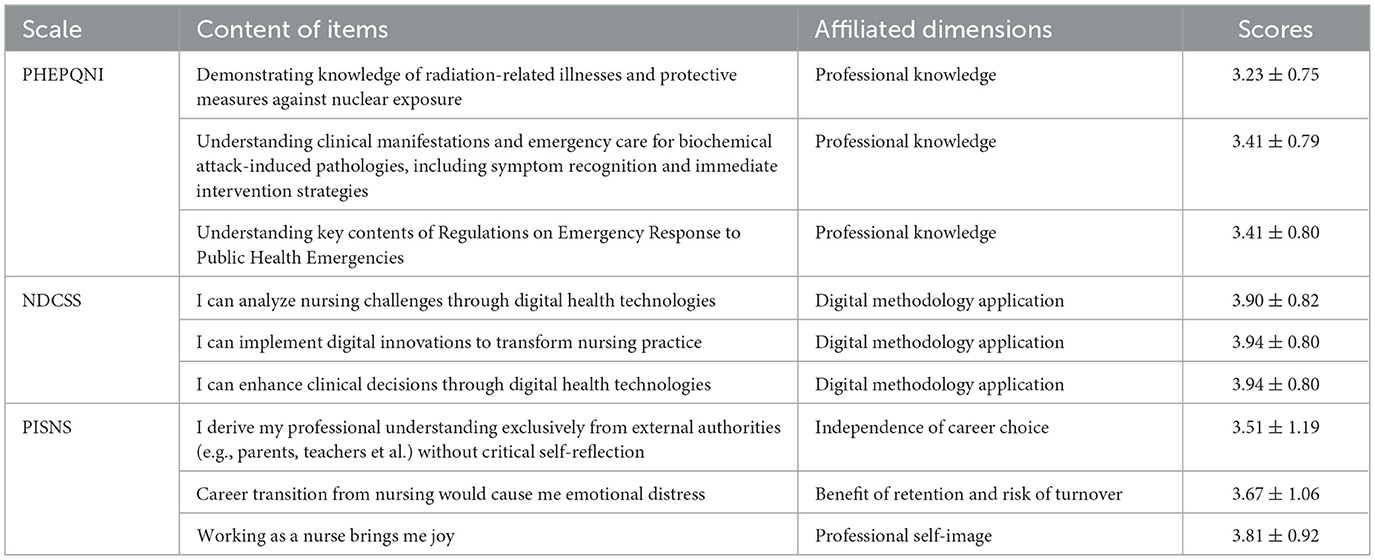
Table 3. Enumeration of items with the lowest scores on the PHEPQNI, NDCSS, and PISNS ( ± s, score).
3.3 Influencing factors of Generation Z nursing interns' public health emergency preparedness
3.3.1 Univariate analysis
As shown in Table 1, the univariate analysis revealed significant differences in Generation Z nursing interns' emergency preparedness scores across the following factors: education level, motivation for choosing nursing, attitude toward nursing profession, level of intern hospital, participation in public health emergency rescue or volunteer work and participation in public health emergency training or simulation drills (p < 0.05).
3.3.2 Correlations between PHEPQNI, NDCSS, and PISNS
As shown in Table 4, Pearson correlation analysis revealed that the total score of PHEPQNI statistically significant positive correlated with the total score of the NDCSS, digital information retrieval and evaluation, digital methodology application, digital security and responsibility (r = 0.431–0.530, p < 0.05). The total score of PHEPQNI also positively correlated with the total score of PISNS, professional self-image, benefit of retention and risk of turnover, social comparison and self-reflection, independence of career choice, and social modeling (r = 0.289–0.442, p < 0.05).
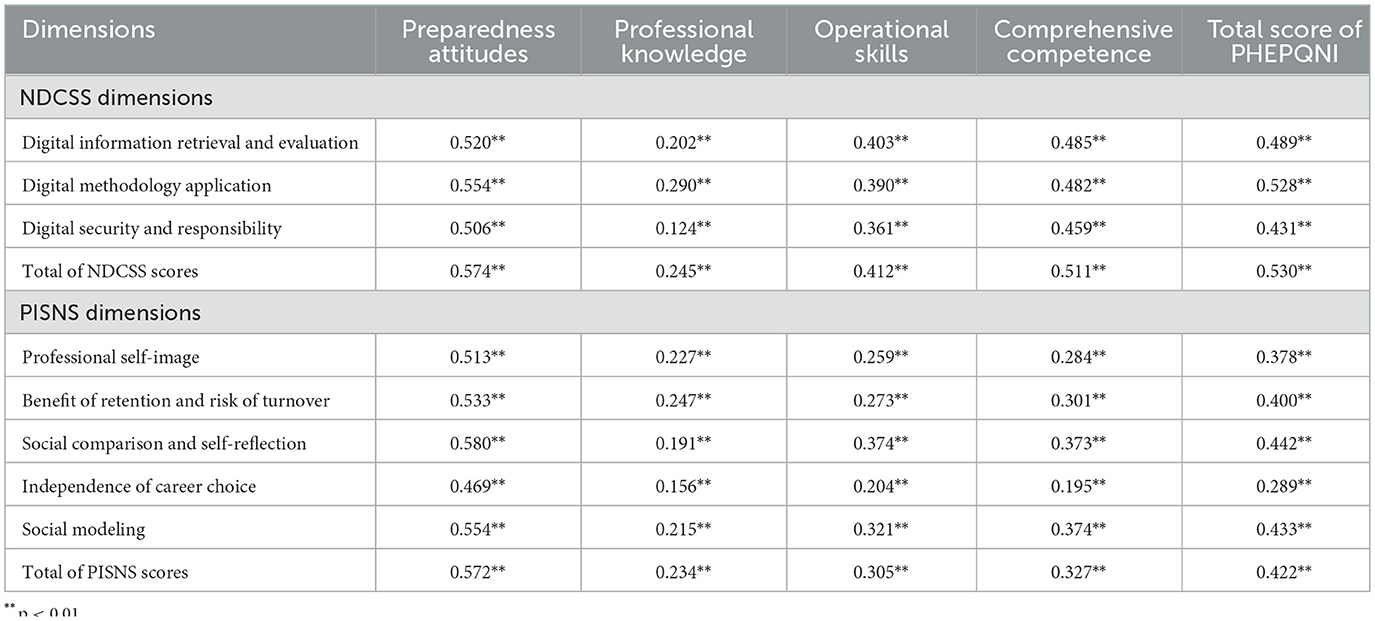
Table 4. Correlation between public health emergency preparedness, digital competence, and professional identity.
3.3.3 Multiple stepwise linear regression analysis
A multiple stepwise linear regression analysis was conducted to examine influencing factors of public health emergency preparedness for Generation Z nursing interns. The emergency preparedness scores of nursing interns was used as the dependent variable and eight variables with statistical significance identified in univariate and correlation analyses were included as independent variables. Variable assignments and dummy variable coding are detailed in Table 5. The results demonstrated that the level of the internship hospital, digital competence of nursing, and professional identity significantly were factors influencing emergency preparedness for public health emergency for nursing interns (p < 0.05). More detailed results of multiple stepwise linear regression are presented in Table 6.

Table 6. Multiple stepwise linear regression analysis of factors influencing the public health emergency preparedness (n = 434).
4 Discussion
4.1 The current status of public health emergency preparedness for Generation Z nursing interns
This study revealed that the overall emergency preparedness score among 434 nursing interns was 95.79 ± 11.03. This may be attributed to the self-improvement of nursing interns in competency, the accumulation of practical experience, and the enhancement of nursing disaster education. Firstly, frequent public health emergencies, notably the COVID-19 pandemic and mpox outbreak, have driven nursing students to proactively engage in acquiring emergency preparedness knowledge and refining risk perception capabilities. Participation in volunteer services and pandemic management has systematically accumulated substantial professional response experience among nursing interns (28–30). Secondly, nursing education systems have improved curriculum design by introducing specialized disaster nursing courses that focus on public health emergency response since the outbreak of the COVID-19 pandemic (31, 32). These courses incorporate targeted instructional content that effectively enhances nursing students' crisis response competencies and qualifies them for public health emergency preparedness.
The analysis of dimensions demonstrated that the lowest scores emerged in professional knowledge, particularly in the understanding of chemical, biological, radiological, nuclear (CBRN) protection and healthcare legal and regulatory knowledge. The deficiencies may be attributed to nursing education systems focusing on general public health emergency preparedness while lacking systematic educational frameworks for specialized domains such as CBRN protection and disaster medical response strategies (33, 34). During clinical internship, nursing interns rarely encounter knowledge or experience related to such special public health emergencies, exacerbating in insufficient mastery of relevant professional knowledge. Legal education's abstract nature further diminishes the engagement of learning motivation, exacerbating insufficient mastery of relevant professional knowledge (35). Therefore, it is recommended that nursing colleges establish systematic training curricula emphasizing emergency care for natural disasters, CBRN protection, and nursing-related legal education. Internship hospitals should adopt innovative pedagogical approaches, such as implementing scenario-based simulation drills for CBRN attack or natural disaster casualties and conducting practical assessments to reinforce students' understanding of specialized knowledge. Meanwhile, nursing colleges and internship hospitals should jointly organize legal knowledge seminars and develop interdisciplinary legal courses to strengthen students' legal literacy and improve their comprehension of nursing-related laws and regulations.
This study indicated that the comprehensive competency of Generation Z nursing interns in responding to public health emergencies is relatively inadequate, particularly in psychological assessment and health education capabilities. Several studies (36–38) have showed that inadequately prioritizing learning health education and psychological intervention curricula during academic training resulting in nursing students' superficial mastery of psychological care competencies. During clinical internship, health education responsibilities predominantly fall to clinical preceptors due to the transitional role of nursing interns (37). In addition, aligning with the ICN Core Competencies in Disaster Nursing (39), Generation Z nursing interns should require prioritized development in psychological care competencies. Therefore, nursing schools should enhance psychological assessment training in public health emergency courses, while hospitals should provide structured health education practice to improve nursing interns' comprehensive competency in managing patients' psychological crises.
4.2 Analysis of the influencing factors of emergency preparedness for public health emergency for nursing interns
4.2.1 Digital competence
Digital competence refers to nursing professionals' ability to utilize digital technologies with confidence, responsibility, and critical thinking in clinical practice, education, and social engagement (25). This study quantified nursing interns' digital competence at 111.59 ± 16.06, reflecting upper-moderate proficiency that is potentially attributed to their status as digital natives from Generation Z who possess inherent technological adaptability (40, 41). However, a concerning deficiency emerges in Generation Z nursing interns' digital technology application competence, particularly in synthesizing technological applications with clinical practice requirements (42). These underperforming indicators directly mirror the operational demands of digital preparedness required for effective public health emergency response systems. Several studies (20, 43) have demonstrated that inadequate digital competencies among nursing professionals exacerbate technology-related anxiety, impede adaptation to digital healthcare transformations, and ultimately undermine the effectiveness of emergency response. The potential reasons for the limited digital application competence among Generation Z nursing interns may stem from the absence of a systematic theoretical framework in cultivating higher-order digital literacy and skills during academic training. Current educational interventions predominantly emphasize fragmented aspects such as digital content analysis and rudimentary operational training for clinical devices, which fail to bridge the competency gap required for a complex clinical environment and emergency digital utilization scenarios (44). During clinical internship, nursing interns are predominantly assigned primary care tasks, limiting their opportunities to engage with healthcare digital systems and autonomously apply clinical technologies in complex cases (45). Notably, in the regression model, digital competence exhibited the highest standardized regression coefficient (β = 0.412, p < 0.001), indicating its dominant effect size relative to other predictors, which implies that educational interventions focused on digital competence may yield greater improvements in public health emergency preparedness. To bridge this competency gap in the post-pandemic era, it is necessary to integrate relevant training modules in public health emergency courses, which focus on clinical applications mediated by digital technology rather than technical familiarity. Concurrently, internship hospitals should implement emergency drills requiring nursing interns to utilize digital technology to execute emergency response, thereby enhancing emergency preparedness through contextualized skill application.
4.2.2 Professional identity
This study showed that Generation Z nursing interns exhibit a high level of professional identity, which is an influencing factor of public health emergency preparedness. The enhanced societal recognition of nursing science in COVID-19 pandemic, as well as optimized post-pandemic internship programs, have reinforced Generation Z nursing interns' professional identity through positive valuation (46, 47). Zhang et al. (23) label professional identity as a critical determinant of nursing students' emergency attitudes, suggesting that nursing students with higher professional identity exhibit more proactive responses and positive attitude during crises. Positive emergency attitudes drive nursing interns to improve their emergency preparedness while boosting confidence and willingness to participate in rescue efforts (48). The finding of this study implies that nursing education systems in the post-pandemic era require integrated strategies to strengthen professional identity formation. The regression model demonstrated a relatively high effect size for professional identity (β = 0.121, p = 0.030), suggesting that interventions targeting professional identity enhancement among nursing students may serve as a significant pathway to elevate their preparedness for public health emergencies. Nursing schools should establish structured psychological support programs and career exploration workshops during academic training, while hospitals must implement clinical internship environment optimization measures and reduce work pressure. Through all these interventions, Generation Z nursing interns systematically can internalize the profession's core principles and societal significance, elevate professional identity and ultimately enhance emergency preparedness for public health.
4.2.3 Level of internship hospital
This study indicated that Generation Z nursing interns in Grade-A tertiary hospitals exhibited superior preparedness scores for public health emergencies. The reasons may be as follows: designated as China's highest-tier medical institutions, Grade-A tertiary hospitals possess abundant healthcare resources, operate with comprehensive departmental structures including specialized units such as infectious disease departments, fever clinics, and emergency departments (49, 50). During the 8–10-month clinical rotation cycle, Generation Z nursing interns at Grade-A tertiary hospitals undergo training in specialized units. This training program enables their systematic mastery of core competencies, including critical care and infection prevention. Additionally, Grade-A tertiary hospitals established a comprehensive emergency management framework spanning prevention, surveillance, crisis resolution, and staff training (51). Generation Z nursing interns are integrated into public health emergency responding and training systems within these hospitals, and their public health emergency preparedness are cultivated through simulated and actual emergency scenarios (49). However, lower preparedness levels among Generation Z nursing interns in non-tertiary hospitals underscore systemic disparities. Compared with Grade-A tertiary hospitals, these hospitals exhibit significant gaps in clinical training quality, emergency resource reserves, and response mechanisms (51). Given the universal responsibility of multi-level healthcare institutions in public health emergency response, regional collaborative frameworks enabling cross-hospital emergency training resource sharing should take prioritization in the post-pandemic era. Therefore, standardized emergency courses should be delivered to grassroots hospitals through a remote teaching platform led by Grade-A tertiary hospitals, and the assessment of emergency preparedness for nursing interns in grassroots hospitals should be incorporated into teaching indicators. Through the above measures, the emergency preparedness level of Generation Z nursing interns in internship hospitals at different levels can be systematically improved.
4.2.4 Attitude toward nursing major
This study indicated that Generation Z nursing interns with a more proactive attitude toward nursing major exhibited significantly higher emergency preparedness scores for public health emergencies compared with those with a lower passion for the nursing major. Attitude toward nursing major refers to nursing students' cognitive understanding and emotional responses toward the nursing profession, which collectively shape an enduring psychological disposition that directly governs their behavioral patterns (52). Generation Z nursing interns demonstrating a positive attitude manifested intrinsic motivation that stimulated profound interest in acquiring emergency response knowledge (53, 54). This self-driven learning propensity facilitated sustained engagement in mastering critical skills, thereby establishing substantive cognitive reserves through autonomous knowledge accumulation. Furthermore, Generation Z nursing interns with positive attitude toward nursing major displayed heightened endorsement to nursing's vocational values (55). The permeation of vocational values arouses Generation Z nursing interns' strong sense of professional calling, leading them to actively assume occupational responsibilities and voluntarily strengthen learning in public health emergency response competency (56). Therefore, nursing schools and internship hospitals should strengthen professional advocacy and emotional inculcation to enhance Generation Z nursing interns' comprehension of nursing's intrinsic value and foster greater professional enthusiasm, thereby cultivating a positive attitude toward nursing major and elevating Generation Z nursing interns' public health emergency preparedness.
5 Conclusion
This study reveals that Generation Z nursing interns in the post-pandemic era demonstrate an upper-moderate level of public health emergency preparedness, with digital competence, professional identity, the level of internship hospital and attitude toward nursing major emerging as critical determinants. While their emergency attitudes reflect strong professional responsibility, gaps exist in knowledge of specialized fields, psychological crisis intervention skills, and legal regulatory awareness. For Generation Z nursing interns exhibiting strong technological adaptability with limited crisis exposure, nursing schools and internship hospitals should prioritize the training in professionalism, digital competencies, and stress resilience. Amidst the ongoing evolution of global health systems in the post-pandemic era, targeted cultivation of public health emergency preparedness among Generation Z nursing interns is fundamental to establishing sustainable emergency response systems.
6 Limitation
This study has several limitations that warrant consideration. First, the cross-sectional design inherently restricts causal inference between identified factors and public health emergency preparedness. Second, as Zhengzhou is a provincial capital with relatively concentrated medical resources within Henan Province, the data from nursing interns in this city cannot adequately capture regional disparities, thus limiting the generalizability of our findings to other healthcare systems and regions with scarce healthcare resources. Third, self-reported data may introduce social desirability bias. Within China's healthcare culture that emphasizes altruistic dedication, this could lead participants to overestimate their emergency response capabilities. Fourth, due to the limitations in the study scope and sample size, other potential influencing factors could not be examined, suggesting that future research should expand the scope by investigating additional multidimensional factors for in-depth analysis. Moreover, it should be noted that the instrument for emergency preparedness used in this study was primarily developed based on the Chinese emergency management framework. Consequently, its applicability may be limited within healthcare systems of other cultural contexts. Furthermore, the relatively low reliability of PISNS subscales may lead to diminished effect sizes, potentially resulting in underestimation of the association between professional autonomy and emergency preparedness. Future research should employ longitudinal designs with multi-regional sampling to validate these findings and conduct intervention studies, which could contribute to improving the public health emergency preparedness of the whole Generation Z nursing interns.
Data availability statement
The raw data supporting the conclusions of this article will be made available by the authors, without undue reservation.
Ethics statement
The studies involving humans were approved by the First Affiliated Hospital of Xi'an Jiaotong University. The studies were conducted in accordance with the local legislation and institutional requirements. The participants provided their written informed consent to participate in this study.
Author contributions
CD: Conceptualization, Visualization, Methodology, Data curation, Investigation, Validation, Writing – review & editing, Resources, Project administration, Writing – original draft, Formal analysis. GF: Visualization, Writing – review & editing, Formal analysis, Validation, Methodology, Supervision, Conceptualization, Project administration. XZ: Visualization, Conceptualization, Data curation, Project administration, Validation, Methodology, Writing – review & editing. YZ: Visualization, Conceptualization, Data curation, Project administration, Validation, Writing – review & editing, Methodology. YJ: Supervision, Validation, Methodology, Visualization, Writing – review & editing, Conceptualization. XS: Visualization, Writing – review & editing, Validation, Supervision, Methodology, Conceptualization. Y-PZ: Supervision, Methodology, Validation, Conceptualization, Writing – review & editing, Funding acquisition, Project administration, Visualization, Resources.
Funding
The author(s) declare that financial support was received for the research and/or publication of this article. This study was funded by Shaanxi Provincial Educational Science Planning Project (SGH23Y2186).
Acknowledgments
We extend our gratitude to the 434 Generation Z nursing interns in Zhengzhou for their support and cooperation. We would like to acknowledge all participants and hospitals in this study.
Conflict of interest
The authors declare that the research was conducted in the absence of any commercial or financial relationships that could be construed as a potential conflict of interest.
Generative AI statement
The author(s) declare that no Gen AI was used in the creation of this manuscript.
Any alternative text (alt text) provided alongside figures in this article has been generated by Frontiers with the support of artificial intelligence and reasonable efforts have been made to ensure accuracy, including review by the authors wherever possible. If you identify any issues, please contact us.
Publisher's note
All claims expressed in this article are solely those of the authors and do not necessarily represent those of their affiliated organizations, or those of the publisher, the editors and the reviewers. Any product that may be evaluated in this article, or claim that may be made by its manufacturer, is not guaranteed or endorsed by the publisher.
References
1. Fang X, Zhao L, Pang R, Li H, Ye P. Responsibility of education in improving medical college students' ability to prevent and respond to public health emergencies in China – a systematic review. Front Public Health. (2023) 11:1191723. doi: 10.3389/fpubh.2023.1191723
2. Zhang D, Jia Y, Chen Y, Liao Q, Wang M, Zhang Y-P. Experiences, challenges, and training reflections of nurses in isolation wards during different pandemic prevention policy periods: a qualitative study. BMC Nurs. (2025) 24:364. doi: 10.1186/s12912-025-02898-0
3. Liu Y, Huang W, Zhao Y, Wen Y, Liu X. Current status and enlightenment of cultivating nurses' ability to respond to public health emergencies. Nurs Practice and Res. (2021) 18:3668–71.
4. Yang H, Tang G, Zhu X. Investigation and analysis of emergency response ability of intern nursing students from secondary vocational schools in public health emergencies. Health Vocational Educ. (2023) 41:114–7.
5. Barisone M, Ghirotto L, Busca E, Diaz Crescitelli ME, Casalino M, Chilin G, et al. Nursing students' clinical placement experiences during the Covid-19 pandemic: a phenomenological study. Nurse Educ Pract. (2022) 59:103297. doi: 10.1016/j.nepr.2022.103297
6. Collado-Boira EJ, Ruiz-Palomino E, Salas-Media P, Folch-Ayora A, Muriach M, Baliño P. “The COVID-19 outbreak”-An empirical phenomenological study on perceptions and psychosocial considerations surrounding the immediate incorporation of final-year Spanish nursing and medical students into the health system. Nurse Educ Today. (2020) 92:104504. doi: 10.1016/j.nedt.2020.104504
7. Velarde-García JF, Cachón-Pérez JM, Rodríguez-García M, Oliva-Fernández O, González-Sanz P, Espejo MM, et al. The challenges of “learning on the go”: a qualitative study of final-year Spanish nursing students incorporated to work during the first Covid-19 pandemic. Nurse Educ Today. (2021) 103:104942. doi: 10.1016/j.nedt.2021.104942
8. Banstola B, Shakya N, Sharma P. Anxiety among nursing students towards clinical placement during COVID-19 in a tertiary hospital of Nepal: a descriptive cross-sectional study. J Nepal Med Assoc. (2021) 59:542–6. doi: 10.31729/jnma.6132
9. Seah B, Ho B, Liaw SY, Ang ENK, Lau ST. To Volunteer or not? Perspectives towards pre-registered nursing students volunteering frontline during COVID-19 pandemic to ease healthcare workforce: a qualitative study. Int J Environ Res Public Health. (2021) 18:6668. doi: 10.3390/ijerph18126668
10. Bazan D, Nowicki M, Rzymski P. Medical students as the volunteer workforce during the COVID-19 pandemic: Polish experience. Int J Disaster Risk Reduct. (2021) 55:102109. doi: 10.1016/j.ijdrr.2021.102109
11. Xu B, Yu J, Li S, Chen L, Lin Z. Factors influencing the coping abilities in clinic nursing students under public health emergency (COVID-19): a cross-sectional study. BMC Nurs. (2021) 20:167. doi: 10.1186/s12912-021-00686-0
12. Xu Y, Zhang Y. Research progress on nursing students' emergency preparedness for public health emergencies. Chin Gen Pract Nurs. (2022) 20:4386–9.
13. Xu Y. Development and Validation of an Emergency Preparedness Questionnaire for Public Health Emergencies for Nursing Intern. Zhengzhou: Zhengzhou University (2023).
14. Cecconi C, Adams R, Cardone A, Declaye J, Silva M, Vanlerberghe T, et al. Generational differences in healthcare: the role of technology in the path forward. Front Public Health. (2025) 13:1546317. doi: 10.3389/fpubh.2025.1546317
15. Cao Y, Fang H, Liu Y, Yang H, Wang D. Survey of cognition of practice nursing students on emergency rescue of sudden public events. Chin Nurs Res. (2015) 29:2840–43. doi: 10.3969/j.issn.1009-6493.2015.23.009
16. Gu X, Wang Y. Study on the correlation between the emergency response ability and attitude of clinical nurses to public health emergencies in Yunnan province. Chin Clin Nurs. (2022) 14:537–41.
17. Qian J, Dai B, Qiao J, Ji Y, Wang X, Zhang C. Investigation and analysis on the current situation of public health emergencies emergency response capabilities of nurses in tertiary hospitals. China J Emerg Resusc Disaster Med. (2022) 17:114–7.
18. Li Z, Zhao L, Deng W, Xu L, Huang H, Tian F, et al. Analysis of nurses' knowledge, belief and practice in responding to public health emergencies and rescue operations. Nurs Pract Res. (2022) 19:3505–10.
19. Clarke-Darrington J, McDonald T, Ali P. Digital capability: an essential nursing skill for proficiency in a post-COVID-19 world. Int Nurs Rev. (2023) 70:291–6. doi: 10.1111/inr.12839
20. Isidori V, Diamanti F, Gios L, Malfatti G, Perini F, Nicolini A, et al. Digital technologies and the role of health care professionals: scoping review exploring nurses' skills in the digital era and in the light of the COVID-19 pandemic. JMIR Nurs. (2022) 5:e37631. doi: 10.2196/37631
21. Li X, Ma G, Qiao K, Yan Y, Zhang H, Zhang Y. Analysis of the information ability of nurses in county hospitals in northern Henan province: a survey. BMC Nurs. (2023) 22:247. doi: 10.1186/s12912-023-01416-4
22. Xu D, Zhou Y, Yan Y, Wang Y, Le Y, Ma Y, et al. Resilience and professional identity among young healthcare workers in a Shanghai megahospital during COVID-19: a cross-sectional study. Front Public Health. (2025) 13:1632053. doi: 10.3389/fpubh.2025.1632053
23. Zhang P, Liang F, Qu R, Guo R, Zhang Q, Zhang H. Professional identity and its relationship with emergency attitudes to public health emergencies among undergraduate nursing interns during the outbreak of COVID-19. Chin Nurs Manag. (2021) 21:398–402.
24. Wang Z, Hui X, Zhang Y, Wang J, Zhang W. Investigation on the current situation of intern nursing students' ability to respond to public health emergencies. Health Vocational Education. (2021) 39:127–8.
25. Qin S, Zhang J, Sun X, Meng G, Zhuang X, Jia Y, et al. Scale for measuring nursing digital application skills: a development and psychometric testing study. BMC Nurs. (2024) 23:366. doi: 10.1186/s12912-024-02030-8
26. Hao Y-F, Niu H-J, Li L-P, Yue S-J, Liu X-H. Measurement of professional identity in Chinese nursing students. Int J Nurs Sci. (2014) 1:137–44. doi: 10.1016/j.ijnss.2014.05.002
27. Kline R, Rex B. Principles and Practice of Structural Equation Modeling. 3rd ed. New York, NY: The Guilford Press (2011).
28. Domaradzki J, Walkowiak D. Medical students' voluntary service during the COVID-19 pandemic in Poland. Front Public Health. (2021) 9:618608. doi: 10.3389/fpubh.2021.618608
29. Appelbaum NP, Misra SM, Welch J, Humphries MH, Sivam S, Ismail N. Variations in medical students' educational preferences, attitudes and volunteerism during the COVID-19 global pandemic. J Community Health. (2021) 46:1204–12. doi: 10.1007/s10900-021-01009-9
30. Stumbar SE, Garba NA, Minor S, Toonkel R, Bonnin R, Obeso V. Medical students' perspectives on opportunities to engage in the clinical care of COVID-19 patients during the pandemic. South Med J. (2023) 116:405–9. doi: 10.14423/SMJ.0000000000001557
31. Hung MSY, Lam SKK, Chow MCM, Ng WWM, Pau OK. The effectiveness of disaster education for undergraduate nursing students' knowledge, willingness, and perceived ability: an evaluation study. Int J Environ Res Public Health. (2021) 18:10545. doi: 10.3390/ijerph181910545
32. Hu Y, Jiang L, Hu J, Tao X, Li N, Lian J, et al. Development and application of a nursing training course for response to public health emergencies. Chin J Nurs Educ. (2022) 19:489–95.doi: 10.3761/j.issn.1672-9234.2022.06.002
33. Yoshida M, Iwamoto S, Okahisa R, Kishida S, Sakama M, Honda E. Knowledge and risk perception of radiation for Japanese nursing students after the Fukushima Nuclear Power Plant disaster. Nurse Educ Today. (2020) 94:104552. doi: 10.1016/j.nedt.2020.104552
34. Bahadori P, Molina-Recalde AP, Saleh Alruwaili A, Alanazy A, Tilahun WT, Ayub G, et al. Assessment of medical students' knowledge regarding radiation associated risk and its protection: finding from a cross-sectional study. Ir J Med Sci. (2023) 193:1515–9. doi: 10.1007/s11845-023-03583-4
35. Zheng Y, Zhong M, Hu J, Liang L, He D, Gao Q. Investigation on the current situation and demand of legal education for practical nurses under the background of the proposal of “nurse law”. Chin Evid-Based Nurs. (2022) 8:654–7.
36. Yan C, Zhang R, Yan S. Investigation and analysis of influencing factors on the psychological health assessment ability of nursing students under the background of cultivating core literacy. J Inn Mong Med Univ. (2021) 43:124–6.
37. Zhang Z, Geng L, Ceng L, Lv Y. Relationships among health education ability, self directed learning ability and self efficacy in nursing students during clinical practice. J Nurs Sci. (2020) 35:79–80+90.
38. Zhang Y, Zhou C. Analysis of the current situation and influencing factors of health education ability of vocational nursing interns in Nanjing. China High Med Edu. (2023) 25–7.
39. International Council of Nurses. Core Competencies in Disaster Nursing (2019). Available online at: https://www.icn.ch/sites/default/files/2023-04/ICN_Disaster-Comp-Report_WEB.pdf (Accessed March 30, 2025).
40. Pathipati AS, Azad TD, Jethwani K. Telemedical education: training digital natives in telemedicine. J Med Internet Res. (2016) 18:e193. doi: 10.2196/jmir.5534
41. Wong BLH, Khurana MP, Smith RD, El-Omrani O, Pold A, Lotfi A, et al. Harnessing the digital potential of the next generation of health professionals. Hum Resour Health. (2021) 19:50. doi: 10.1186/s12960-021-00591-2
42. Frings D, Sykes S, Ojo A, Rowlands G, Trasolini A, Dadaczynski K, et al. Differences in digital health literacy and future anxiety between health care and other university students in England during the COVID-19 pandemic. BMC Public Health. (2022) 22:658. doi: 10.1186/s12889-022-13087-y
43. Martzoukou K, Luders ES, Mair J, Kostagiolas P, Johnson N, Work F, et al. Cross-sectional study of discipline-based self-perceived digital literacy competencies of nursing students. J Adv Nurs. (2023) 80:656–72. doi: 10.1111/jan.15801
44. Stunden A, Ginige A, O'Reilly R, Sanagavarapu P, Heaton L, Jefferies D. Nursing students' preparedness for the digitalised clinical environment in Australia: an integrative review. Nurse Educ Pract. (2024) 75:103908. doi: 10.1016/j.nepr.2024.103908
45. Kleib M, Nagle LM, Furlong KE, Paul P, Duarte Wisnesky U, Ali S. Are future nurses ready for digital health? Informatics competency baseline assessment. Nurse Educ. (2022) 47:E98–104. doi: 10.1097/NNE.0000000000001199
46. Li S, Tan L, Zhou J, Zhang J, Zou Y, Wang T. Research progress on the influence of clinical environment on the occupational identity of nursing interns. J Guizhou Univ Tradit Chin Med. (2022) 44:83–6.
47. Shi Q, Zhong Y, He X. Study on the influencing factors and training strategies of nursing students' occupational identity during the COVID-19 pandemic. China Med Edu Technol. (2022) 36:634–7
48. Chen M, Chen Z, Li J. Research on the core emergency capability of mobile nurses in public health emergencies in the post-pandemic era. J Nurses Train. (2021) 36:1902–6.
49. Li F, Shi Y, Gao Y, Zou C, Wang H, Sun M, et al. Survey on current situation of emergency response capacity of 60 medical institutions to public health emergencies in Dezhou city, Shandong province. Prev Med Trib. (2023) 29:586–9.
50. Hu Q, Tang T. An application research on the emergency response capacity of large public hospitals to adapt to the development needs of the new times. Mod Hosp. (2023) 23:1814–6.
51. Dong Y, Gu X, Cai S, Yang J, Yang H, Guan Q. Current situation and influencing factors of nurses' ability to respond to public health emergencies in Yunnan Province. J Kunming Med Univ. (2024) 45:184–90.
52. Zhang S, Lai C, Li J, Zhang Y, Wang Z, Zhang Z, et al. Research progress on influencing factors of nurses' professional attitude. J Nurs. (2024) 31:38–41.
53. Zhang L, Wang Y, Li W, Dong B, Song Y, Liu L. Influence of personality traits and professional attitude on self-directed learning ability of nursing students in Liaoning Province. Occup Health. (2024) 40:1965–70.
54. Du J, Dan X, Zhou L, Deng Q, Wang X, He Y. Correlation and influencing factors between self- directed learning readiness and achievement motivation of undergraduate nursing students. Tianjin J Nurs. (2021) 29:651–5.
55. Gu X, Yang Y, Gong H, Zhou L. Perception and experience of altruism in graduate nursing students. Nurs Ethics. (2023) 30:1125–37. doi: 10.1177/09697330231161681
Keywords: public health emergency, preparedness, Generation Z, nursing, post-pandemic era
Citation: Duan C, Feng G, Zhuang X, Zhou Y, Jia Y, Sun X and Zhang Y-P (2025) Factors influencing the public health emergency preparedness among Generation Z nursing interns in the post-pandemic era: a cross-sectional study. Front. Public Health 13:1632609. doi: 10.3389/fpubh.2025.1632609
Received: 21 May 2025; Accepted: 11 August 2025;
Published: 29 August 2025.
Edited by:
Peng Cui, Nanjing Forestry University, ChinaReviewed by:
Yan-wei Cheng, Henan Provincial People's Hospital, ChinaKhin Thandar Aung, International Islamic University Malaysia, Malaysia
Copyright © 2025 Duan, Feng, Zhuang, Zhou, Jia, Sun and Zhang. This is an open-access article distributed under the terms of the Creative Commons Attribution License (CC BY). The use, distribution or reproduction in other forums is permitted, provided the original author(s) and the copyright owner(s) are credited and that the original publication in this journal is cited, in accordance with accepted academic practice. No use, distribution or reproduction is permitted which does not comply with these terms.
*Correspondence: Yin-Ping Zhang, Y2F0aHl6aEBtYWlsLnhqdHUuZWR1LmNu
†These authors have contributed equally to this work
 Chengxu Duan
Chengxu Duan Guangyi Feng2†
Guangyi Feng2† Xinqi Zhuang
Xinqi Zhuang Yitong Jia
Yitong Jia